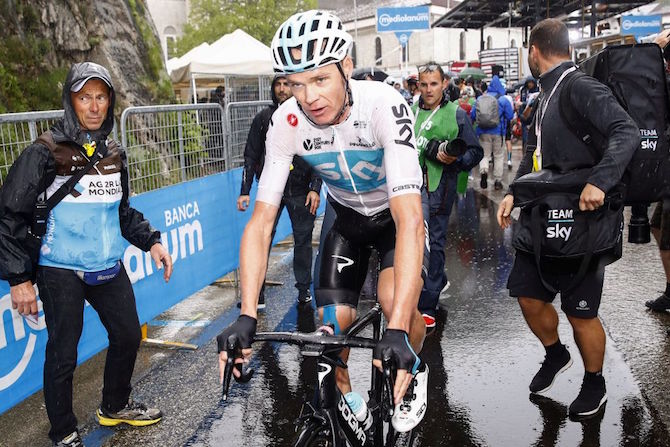UCI closes salbutamol case against Chris Froome
Team Sky leader ready to focus on Tour de France





The UCI has announced that it has closed its anti-doping proceedings against Chris Froome just five days before the start of this year's Tour de France.
ASO try to block Chris Froome from racing Tour de France
Madiot praises ASO for barring Chris Froome from the Tour de France
Landis and Horner: We'd let Froome ride the Tour de France
Chris Froome: Salbutamol case decision 'is a big moment for cycling'
Prudhomme says attempt to bar Chris Froome from Tour de France is now 'obsolete'
Clearing Chris Froome lacks credibility without providing evidence, says anti-doping expert
Chris Froome: Information on salbutamol case to be released in coming days
Team Sky confirm squad to help Chris Froome in Tour de France bid
More details of Chris Froome's successful salbutamol defence
WADA deny giving Chris Froome a legal loophole by avoiding pharmacokinetic study
The Team Sky rider returned an anti-doping sample with twice the permitted level of salbutamol at the 2017 Vuelta a Espana, but the UCI has said that the results do not constitute an adverse analytical finding (AAF).
“In light of WADA’s unparalleled access to information and authorship of the salbutamol regime, the UCI has decided, based on WADA’s position, to close the proceedings against Mr Froome,” read the UCI statement on Monday morning.
“Whilst the UCI would have obviously preferred the proceedings to have been finalised earlier in the season, it had to ensure that Mr Froome had a fair process, as it would have done with any other rider, and that the correct decision was issued. Having received WADA’s position on 28 June 2018, the UCI prepared and issued its formal reasoned decision as quickly as possible in the circumstances.
“The UCI understands that there will be significant discussion of this decision, but wishes to reassure all those involved in or interested in cycling that its decision is based on expert opinions, WADA’s advice, and a full assessment of the facts of the case. The UCI hopes that the cycling world can now turn its focus to, and enjoy, the upcoming races on the cycling calendar.”
Read more...
- ASO try to block Chris Froome from racing Tour de France
- Chris Froome and his struggle for greatness
- Prudhomme: The Chris Froome Tour de France situation is terrible
- Landis and Horner: We'd let Froome ride the Tour de France
- Chris Froome returns adverse analytical finding for salbutamol
- Timeline of Chris Froome's adverse analytical finding for salbutamol
During the final week of last year’s Vuelta a Espana, which Froome went onto win, the Team Sky rider returned a urine test that contained double the permitted level of salbutamol, 2000ng/ml. Froome and Team Sky were notified of the findings on September 20, though it only became public knowledge when news broke in the Guardian and Le Monde papers in December.
The latest race content, interviews, features, reviews and expert buying guides, direct to your inbox!
Froome risked a two-year ban and the loss of his Vuelta title, plus his results since then, if he had been found guilty. Italian rider Diego Ulissi had previously returned levels of 1900ng/ml and was eventually handed a nine-month suspension. As salbutamol is a specified substance, Froome was allowed to continue to race and was given the opportunity to explain how such levels came to be in his test results.
Following an ‘evidentiary phase’, according to the statement issued by the UCI, Froome filed his explanation on June 4, along with additional expert evidence. In an interview with the French newspaper Le Parisien, UCI president David Lappartient said that some 1,500 pages of expert evidence had been submitted. In that same interview, he defended the length of the investigation and admitted his concerns that the case may not have been resolved before the start of the Tour de France.
As allowed by the regulations, Froome has raced throughout the investigation and won the Giro d’Italia in May to become only the third rider to win three consecutive Grand Tours. His participation has been a divisive issue among some riders in peloton, with Tom Dumoulin and Tim Wellens saying that he should remove himself from racing while the case was ongoing.
Former Tour de France champion Bernard Hinault went as far as saying that riders should strike if Froome was to race the Tour. A report in Le Monde on Sunday said that Tour organiser ASO had made a move to stop Froome from riding the Tour using article 29 of its own rules. The clause allows the organiser to “refuse participation in - or to exclude from - the event, a team or any of its members whose presence would be such as to damage the image or reputation of ASO or the event." Team Sky had appealed the decision.
